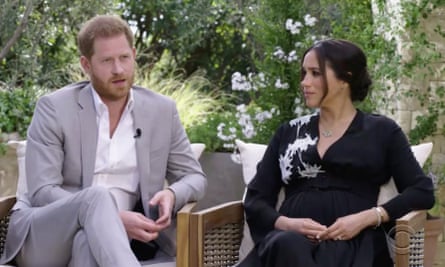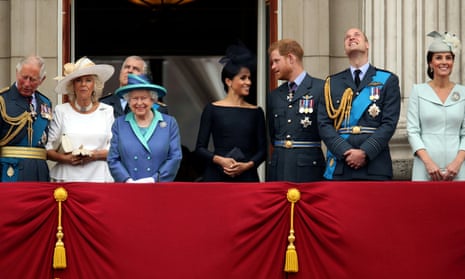Imagine being born into a silk straitjacket, then pushed upon a theatre stage. Your cord cut, you are now a permanent actor in Britain’s public life. As an infant, your burbling will captivate a kingdom. At 12, it will be your grief — millions will watch your little legs shuffle behind your mother’s casket.
The stage props include castles, horses and livery, but only the least imaginative could think that these things are automatically gratifying. In exchange, you must smile about your captivity and genially submit yourself to a press that hacked your phone and helped kill your mother.
The tabloids will describe their own behaviour as “scrutiny”. You will call it criminality. So will a jury examining your mother’s death. So will the Leveson inquiry into media ethics. Regardless, you will hear “scrutiny” invoked to justify all sorts of things: stalking, hacking, gossip, and the fetishisation of your wife’s race.
You don’t belong to yourself, but a collective fantasy. When your wife is conscripted into the troupe, against the advice of her friends, she too experiences the unrestrained intrusions of the tabloids. Then its falsehoods and racism. She will become suicidal.
When this happens, you will be reminded of your dead mother. You will become sick with anger, but asked by your family to remain polite — to keep that upper lip stiff. Restraint maintains mystique. And mystique, not transparency, is vital to continuing the absurdity of a hereditary monarchy. Still, you ask for help – but none comes.
Upon this stage, you have now become an ambassador for mental health – but you will have to gently describe your own grief, anger and depression with the same people that have a substantial budget for buying your private letters and the contents of your bin. You are captive to many things, including the demeaning relationship between press and palace.
When your wife becomes pregnant, some of your family will anxiously speculate about the colour of your child’s skin. Later, they will withdraw the crown’s security guards that protect your family while the media broadcast the location of your new home.

Depending upon the tabloids’ whims, you and your family are either actors in a national soap opera or a personification of the kingdom’s imaginary unity and rectitude. It’s a long, cynical, hallucinatory nightmare.
Who could have anticipated that Prince Harry’s greatest rebellion — previously Hitler dress-ups and binge drinking — would be this heroic assertion of his and his wife’s dignity and independence? Millions will now see Harry and Meghan as indulgent traitors, but after the Oprah interview, we might more accurately see them as historic whistleblowers.
In late 2019, the British media applied some actual scrutiny to their royals. In a strange and accidentally revealing interview, Prince Andrew was asked by the BBC about compelling allegations that he had sex with Virginia Giuffre, 17 at the time and allegedly coerced into the liaison on behalf of the late, convicted sex criminal Jeffrey Epstein. The prince, who denies the allegations against him, was also asked what he knew about his friends’ allegedly extensive trafficking of minors, to which he could only offer alibis and not disgust. Those friends include Epstein’s confidante and alleged pimp, Ghislaine Maxwell, an old university mate of the prince who now occupies a cell awaiting trial for perjury and human trafficking.
Perhaps the prince thought his unctuous accent suggested integrity, but it resembled a man regurgitating toffee. Having failed to acknowledge the many victims of his friend Epstein, and haplessly exposing the morally infantilising effects of his privilege, he announced that he would retreat from public duties.
Today, he refuses formal questioning in the United States. It was an impossible hope, but I prayed that Oprah might broach the subject with Harry and Meghan. If they want to reform their family — rather than just escape it — they could’ve suggested their uncle fly to the old colony and honour justice and Epstein’s victims.
Of course, that was just a dream. Another dream is an Australian republic. This isn’t exactly a moment suffused with national pride, sufficient to leverage another stab at independence. And predictably, following the Oprah interview, the chairman of the Australian Monarchists League said that an Aussie republic is not a priority. He’s right. But the simple genius of arguing that there are more important things is that it’s an argument that can be made in perpetuity. But the process of becoming a republic would not merely be a cosmetic tinkering of our constitution, but an opportunity to substantively reimagine ourselves — or at least to argue for it. Which sounds to me like a tonic to a government that has relied upon inflaming grievances to assume, and retain, power.
A dysfunctional family, whose authority is inherited and conceived in medieval feuds, that is callous to its children, buries inconvenient truths, and relies for its survival upon an “invisible contract” with tabloids, is a profoundly weird thing to hitch our cart to.
Let’s first assume that the death of Queen Elizabeth is the threshold we must pass before seriously reviving the republic question. Now, would a resurgent republican movement help us transcend our own political fractiousness? Or would it be cannibalised by it? I don’t know. But just as it was in 1999, it’s absurd that our sovereignty might be compromised even marginally by this foreign anachronism.
Regardless, let’s hail our unlikely whistleblowers: a prince who was first a husband and father; and a princess who preferred her freedom and health to the reputation of a cult that was indifferent to it.
